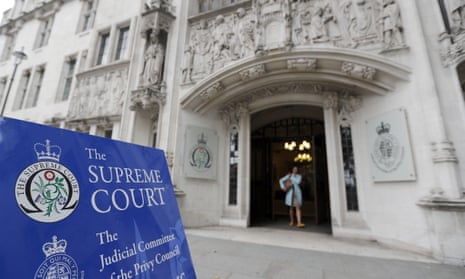Prince Andrew’s decision to cut his losses and settle out of court with Virginia Giuffre grabbed all the headlines. But the most far-reaching legal activity this week may have taken place in London rather than New York, with disturbing implications for the freedom of the press. On Wednesday, in a landmark privacy case, the UK supreme court ruled that suspects in a criminal investigation have the right not to be named in the media, prior to charges being brought against them. On that basis, it rejected an appeal against a previous high court judgment by Bloomberg News, which was found to have breached the privacy rights of a US business executive by naming him as the subject of a criminal inquiry.
In one sense, this was nothing new. The judgment merely confirmed a direction of travel that began a decade ago with the Leveson inquiry. The phone-hacking scandal that led to Leveson came to symbolise the excesses of intrusive and prurient reporting by the tabloid press in particular. In its wake, the concept of privacy – outlined in article 8 of the European convention on human rights – has been interpreted ever more broadly and generously by courts. The right to free expression – and the freedom of the press to report – has correspondingly taken a back seat. In 2018, in the most high-profile case of this type, the high court ruled that the BBC broke privacy law by identifying Sir Cliff Richard as being under investigation over allegations of sexual abuse. He was never arrested or charged.
The potential harm to named suspects who are never charged was always capable of being recognised through a defamation claim. But in the way they choose to balance the competing rights of privacy and freedom of expression, these legal judgments reflect the changed perspectives and priorities of the post-Leveson decade.
Wednesday’s ruling was a sign that the pendulum has swung too far towards the suppression of information which is of legitimate public interest. The Bloomberg case concerned a criminal investigation into the business activities of an executive in a large public company with investors, customers and shareholders. As the news organisation’s editor-in-chief pointed out in a written response, extending the scope of privacy law to this extent will hobble investigative journalism into corporate wrongdoing. From the Libor banking scandal to the exposure of accounting fraud at Wirecard, the public value of such reporting has been repeatedly demonstrated. Nor is it advisable to throw a cloak of secrecy over police investigations, shielding them from the public gaze and accountability. Perhaps most importantly, an excessive legal presumption in favour of privacy removes the possibility of publicity leading to new testimony, as members of the public come forward. This was the way that Harvey Weinstein was brought to justice after decades of sexual predation.
The Bloomberg verdict made clear that there may be cases in which the naming of suspects is in the public interest. But this judgment sends an unequivocal message that the threshold of justification will be intimidatingly, prohibitively high. The right to privacy and protection from reputational damage is in danger of becoming a catch-all instrument with which the powerful and wealthy can erect a screen around the entirety of their lives and shut down scrutiny. A healthy democracy requires a better balance to be struck between the freedom of the press and the right to privacy.
